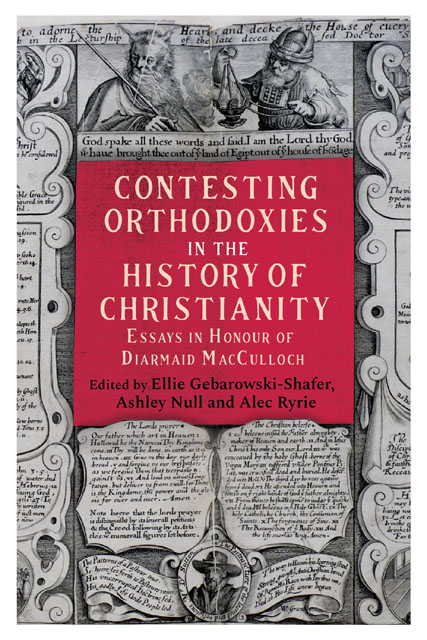Book contents
- Frontmatter
- Contents
- List of Illustrations
- List of Contributors
- List of Abbreviations
- Introduction
- 1 ‘Jewish Christianity’ in Antiquity: Meaningless Category or Heuristic Irritant?
- 2 ‘Sola Fide’: the Wrong Slogan?
- 3 Both Cromwellian and Augustinian: the Influence of Thomas Cromwell on Reform within the Early Modern English Austin Friars
- 4 Lex, Rex and Sex: The Bigamy of Philipp of Hesse and the Lutheran Recourse to Natural Law
- 5 The Authority of Scripture in Reformation Anglicanism: Then and Now
- 6 Orthodoxy and Heresy in the Post-Reformation
- 7 Profanity and Piety in the Church Porch: the Place of Transgression in Early Modern England
- 8 Writing on the Walls: Word and Image in the Post-Reformation English Church
- 9 The Myth of the Church of England
- 10 Mysticism, Orthodoxy and Reformed Identity before the English Revolution: the Case of John Everard
- 11 Sacrilege and the Sacred in England’s Second Reformation, 1640–1660
- 12 ‘I had not the patience to be quiet’: Arthur Bury and The Naked Gospel
- 13 ‘A soul-corrupting indifferentism’: the Intellectual Development of Benjamin Henry Latrobe
- 14 Newman, Dogma and Freedom in the Church
- 15 ‘Tommy, ’ow’s yer soul?’ Reconsidering Religion and the British Soldier
- 16 The King James Vulgate
- 17 The Myth of the Anglican Communion?
- Select bibliography of Diarmaid MacCulloch’s scholarly publications
- Bibliography
- Index
- Tabula Gratulatoria
- Studies in Modern British Religious History
16 - The King James Vulgate
Published online by Cambridge University Press: 09 January 2024
- Frontmatter
- Contents
- List of Illustrations
- List of Contributors
- List of Abbreviations
- Introduction
- 1 ‘Jewish Christianity’ in Antiquity: Meaningless Category or Heuristic Irritant?
- 2 ‘Sola Fide’: the Wrong Slogan?
- 3 Both Cromwellian and Augustinian: the Influence of Thomas Cromwell on Reform within the Early Modern English Austin Friars
- 4 Lex, Rex and Sex: The Bigamy of Philipp of Hesse and the Lutheran Recourse to Natural Law
- 5 The Authority of Scripture in Reformation Anglicanism: Then and Now
- 6 Orthodoxy and Heresy in the Post-Reformation
- 7 Profanity and Piety in the Church Porch: the Place of Transgression in Early Modern England
- 8 Writing on the Walls: Word and Image in the Post-Reformation English Church
- 9 The Myth of the Church of England
- 10 Mysticism, Orthodoxy and Reformed Identity before the English Revolution: the Case of John Everard
- 11 Sacrilege and the Sacred in England’s Second Reformation, 1640–1660
- 12 ‘I had not the patience to be quiet’: Arthur Bury and The Naked Gospel
- 13 ‘A soul-corrupting indifferentism’: the Intellectual Development of Benjamin Henry Latrobe
- 14 Newman, Dogma and Freedom in the Church
- 15 ‘Tommy, ’ow’s yer soul?’ Reconsidering Religion and the British Soldier
- 16 The King James Vulgate
- 17 The Myth of the Anglican Communion?
- Select bibliography of Diarmaid MacCulloch’s scholarly publications
- Bibliography
- Index
- Tabula Gratulatoria
- Studies in Modern British Religious History
Summary
Orthodoxy is given form by language, and language is always in motion. This essay uses the history of the 1611 King James Bible to examine the tension between the fundamental Protestant conviction that the Bible ought to be made available in the ‘vernacular’ – that most mercurial, evanescent form of language – and the long-standing Christian (and pre-Christian) impulse to place certain texts into holy stasis. Protestantism’s emphasis on religion of the heart, and prayer in one’s own native tongue, naturally meant that in England the Bible in use shifted from the Latin Vulgate to translations in English. Yet the desire of the faithful to have the ‘word of God’ fixed and unchanging remained. Out of the many Reformation-era English translations the King James Bible came to be dominant, a victory which rested not only on its monumental prose but on its ability to serve as a successor to the Latin Vulgate, a universal translation that did not appear to be a denominational weapon. The essay argues that over the following centuries the King James Bible became in effect a new English Vulgate, a pillar of orthodox teaching and practice acquiring something close to inspired status. The very fact of its language being left behind by everyday usage gave it the opportunity to achieve universal relevance by transcending its own cultural context. We see in Gebarowski-Shafer’s study another glimpse at the diversity, cross-channel influences and global reach of English national religion.
The respective histories of the Latin Vulgate and the King James Version of the Bible are well known, yet a comparison of their trajectories yields insights about what has caused several versions of Christian Scripture to achieve widespread use and enduring power over many centuries. Devout readers and liturgists, believing the respective translations conveyed orthodox teachings, clashed directly for about four centuries, disagreeing over which version conveyed the truth of God’s Word, effective for answered prayers in this life and salvation in the world to come. Read in the Roman Catholic Church since the early medieval period, the Latin Vulgate in several corrected recensions served the world’s largest Christian denomination as the official version of Scripture from 1546 to 1962.
- Type
- Chapter
- Information
- Contesting Orthodoxies in the History of ChristianityEssays in Honour of Diarmaid MacCulloch, pp. 281 - 293Publisher: Boydell & BrewerPrint publication year: 2021



